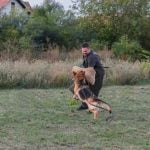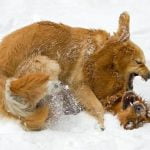How hard is it to train a duck dog? Training a duck dog requires patience, dedication, and a deep understanding of the unique characteristics and behaviors of these loyal hunting partners. In this article, we will explore the ins and outs of training a duck dog, from understanding their role in the hunting field to the challenges and rewards of building a strong partnership with these specialized canines.
A duck dog plays a crucial role in the hunting process, assisting hunters in retrieving waterfowl and ensuring a successful hunt. With their natural instincts and specialized training, these dogs are an indispensable asset to any hunting team. However, training a duck dog is not without its challenges, requiring handlers to possess a deep understanding of the breed’s traits and tendencies.
In the following sections, we will delve into the characteristics that make duck dogs unique, providing insights into their behavior and instincts that are essential for effective training. We will also discuss the fundamentals of the training process and share valuable tips for overcoming common challenges.
Additionally, we will highlight advanced training techniques and share real-life success stories that demonstrate the rewarding journey of training a duck dog. So let’s dive into the world of duck dog training and uncover the intricacies of building a strong partnership with these remarkable hunting companions.
The Characteristics of a Duck Dog
Duck dogs, also known as waterfowl retrievers, possess a unique set of characteristics that make them well-suited for their role in hunting and retrieving ducks. These traits set them apart from other breeds and are essential to their success in the field.
Physical Attributes
Duck dogs are typically medium to large-sized breeds with strong, muscular bodies and webbed feet, making them excellent swimmers. Their water-resistant coats and insulating undercoats allow them to work in various weather conditions, including cold water. These physical attributes make duck dogs well-equipped for the challenges of retrieving game from the water.
Temperament and Intelligence
One of the key characteristics of a successful duck dog is their temperament. They should be sociable, obedient, and have a strong desire to please their handler. Additionally, duck dogs possess high levels of intelligence, problem-solving skills, and an eagerness to learn. This combination of traits makes them versatile and adaptable in various hunting environments.
Hunting Instincts
Duck dogs have an innate hunting instinct that drives their ability to track, retrieve, and locate downed birds. This natural instinct is honed through specific training techniques but provides a solid foundation for their work in the field. Their keen sense of smell and determination make them valuable assets during hunts.
Understanding these unique characteristics is crucial when considering how hard it is to train a duck dog. Their physical attributes, temperament, intelligence, and hunting instincts all play a significant role in the training process and contribute to their success as skilled working dogs.
Understanding the Training Process
When it comes to training a duck dog, it is important to understand the basics of the training process. Duck dogs are unique in that they require specialized training to prepare them for their role in hunting and retrieving ducks.
The first step in the training process is obedience training, which lays the foundation for all other aspects of a duck dog’s training. This includes commands such as sit, stay, heel, and come, which are essential for communication between the handler and the dog.
Following obedience training, duck dogs need to be trained in specific hunting and retrieving skills. This includes teaching them how to search for and flush out ducks, retrieve downed ducks from water or land, and deliver them to the handler without causing any damage to the bird. This type of training requires consistency, patience, and a deep understanding of the natural instincts of a duck dog.
In addition to hunting and retrieving skills, duck dogs also need to be trained in various environmental factors such as water work, decoy work, and gun conditioning. Water work involves introducing the dog to different bodies of water and teaching them how to navigate through it while maintaining focus on their task. Decoy work involves familiarizing the dog with decoys so that they can recognize them during hunting trips.
Gun conditioning is crucial for duck dogs as they need to become accustomed to loud gunshots without getting spooked or distracted from their job. Understanding these basic elements of training is essential when considering how hard it is to train a duck dog.
Overall, the process of training a duck dog requires dedication, consistency, and an understanding of both canine behavior and hunting techniques. It is not an easy task but can be incredibly rewarding when approached with patience and perseverance. Each step in the training process builds upon one another, creating a well-rounded duck dog that can excel in its role during hunting expeditions.
The Importance of Patience
Training a duck dog requires a significant amount of patience and dedication. It can be a challenging process, but with the right techniques and mindset, it is definitely achievable. Here are some key tips for training a duck dog:
1. Establish a strong foundation: Before diving into advanced training techniques, it is crucial to build a strong foundation. This includes basic obedience commands such as sit, stay, and come. Consistency is key when teaching these commands, and it lays the groundwork for more complex training down the line.
2. Use positive reinforcement: Duck dogs respond well to positive reinforcement, such as treats, praise, and playtime. When they successfully perform a command or exhibit desirable behavior, make sure to reward them immediately. This will help reinforce their understanding of what is expected of them.
3. Be patient and consistent: Training a duck dog takes time and patience. It’s important to remain calm and consistent in your approach, as dogs can sense frustration or inconsistency. Set aside dedicated training sessions each day and be persistent in your efforts.
It is not an easy task to train a duck dog, but with patience and perseverance, it can be incredibly rewarding. By following these key tips and maintaining a positive attitude throughout the training process, you can build a strong bond with your duck dog while honing their skills for successful hunting expeditions.
Common Challenges in Duck Dog Training and How to Overcome Them
Behavioral Challenges
Training a duck dog can come with its fair share of behavioral challenges. This may include issues such as stubbornness, distractibility, or even fearfulness. Each dog is unique, and some may require more patience and understanding than others. It is important to address these behavioral challenges early on in the training process to prevent them from becoming ingrained habits.
Overcoming Distractions
One of the common challenges in duck dog training is overcoming distractions, especially in outdoor settings where there are plenty of sights, sounds, and smells that can divert a dog’s attention. To overcome this challenge, it is essential to gradually expose the duck dog to various distractions while reinforcing obedience commands. Consistent training in different environments can also help the dog learn to focus despite external stimuli.
Retrieving Training
Another common challenge is teaching a duck dog reliable retrieving skills. This includes aspects such as delivering the retrieved item directly to the handler’s hand, avoiding dropping it prematurely, or breaking during the retrieve. Patience, repetition, and positive reinforcement are key elements in overcoming this challenge. It is important for handlers to remain patient and consistent while working on retrieving training with their duck dogs.
Overall, training a duck dog comes with its own set of challenges, but with dedication and perseverance from both the handler and the dog, these obstacles can be overcome. Each challenge presents an opportunity for growth and learning for both parties involved.
The Bond Between Handler and Duck Dog
Building a strong bond between a handler and a duck dog is essential for successful training and teamwork in the field. The relationship between the two is built on trust, communication, and understanding of each other’s needs and behaviors. Establishing this bond not only enhances the effectiveness of the training process but also creates a fulfilling partnership that can last throughout the dog’s working life.
The key to fostering a strong bond between a handler and a duck dog lies in consistent, positive interactions. This includes spending quality time together both during training sessions and in everyday activities. Engaging in playtime, walks, and obedience exercises helps to strengthen the connection between the two, leading to better cooperation and teamwork when out in the field.
Furthermore, effective communication is crucial in developing a strong partnership with a duck dog. Handlers should learn to read their dog’s body language and signals, while also using clear verbal commands during training exercises. Understanding how the dog responds to different cues allows for more precise guidance, resulting in improved performance in hunting scenarios. Ultimately, building a strong bond with a duck dog requires dedication, patience, and mutual respect between both handler and canine partner.
Training your duck dog may be challenging at times but building a strong partnership with patience.
Advanced Training Techniques
Training a duck dog is no easy feat, but with dedication and the right techniques, it is possible to take your duck dog to the next level. Advanced training techniques are crucial in honing your duck dog’s skills and preparing them for the demands of hunting. These techniques focus on enhancing their retrieving abilities, obedience, and overall performance in the field.
One key aspect of advanced training for a duck dog is refining their retrieving abilities. This involves increasing their retrieving distance, speed, and accuracy. This can be achieved through consistent practice and gradually challenging your duck dog to retrieve objects from farther distances. Additionally, using decoys and scent marks can help improve their tracking skills, making them more effective hunters in the field.
Another important aspect of advanced training is reinforcing obedience commands under distractions. Duck dogs must remain focused on their handler’s commands even in the midst of various distractions such as other animals or loud noises. Incorporating these distractions into training sessions will help strengthen their obedience and ensure they can perform when it matters most during hunting trips.
Furthermore, advanced training techniques also involve simulating real hunting scenarios to acclimate your duck dog to the conditions they will encounter in the field. This includes training in different types of water bodies, varying weather conditions, and incorporating actual hunting gear into their training routines. By exposing them to these scenarios during training, you can better prepare your duck dog for success during actual hunts.
Overall, advanced training techniques play a crucial role in taking your duck dog to the next level. It requires patience, consistency, and a deep understanding of your duck dog’s capabilities. With dedication and proper training methods, you can maximize your duck dog’s potential as a skilled and reliable hunting companion.
Success Stories
Training a duck dog can be a challenging yet rewarding experience for both the handler and the dog. Many experienced handlers have shared their success stories in training their duck dogs, showcasing the dedication and hard work it takes to develop a well-trained hunting companion.
One of the most crucial aspects of training a duck dog is establishing a strong bond between the handler and the dog. This bond serves as the foundation for effective communication and teamwork while out in the field. Successful duck dog trainers emphasize the importance of patience, consistency, and positive reinforcement in building this bond and nurturing it throughout the training process.
Real-life experiences of training a duck dog often highlight the unique characteristics of these hunting companions. From their natural instincts for retrieving to their adaptability to different environments, these stories shed light on how dedicated training can help harness these qualities to create a skilled and reliable hunting partner.
| Key Point | Description |
|---|---|
| Bond with Handler | Handlers emphasize building a strong bond based on trust and respect to ensure effective communication during hunting activities. |
| Unique Characteristics | Success stories often highlight how well-trained duck dogs showcase their natural retrieving instincts and adaptability in various hunting scenarios. |
| Training Methods | A variety of successful training methods are shared, ranging from positive reinforcement techniques to consistent practice in different hunting environments. |
These success stories serve as inspiration for those embarking on their own journey of training a duck dog, emphasizing that while it may be challenging at times, the result is ultimately worth the effort.
Conclusion
Training a duck dog may seem like a daunting task, but with patience, dedication, and the right techniques, it is definitely achievable. Throughout this article, we have explored the unique characteristics of a duck dog, understanding the training process, overcoming common challenges, and building a strong bond with your canine partner. We have also delved into advanced training techniques and shared success stories from real-life experiences.
So, how hard is it to train a duck dog? The answer is that it requires time, effort, and commitment. Duck dogs are unique in their abilities and instincts, which means that their training should be approached with knowledge and understanding of their specific needs.
However, the rewards of training a duck dog are immeasurable. The bond that forms between handler and dog during the training process is incredibly rewarding and creates a partnership that can last for years to come.
As you embark on this journey of training a duck dog, remember that patience is key. Every dog is different and will progress at its own pace. By staying patient and consistent in your training methods, you will ultimately achieve success.
Celebrate each small victory along the way, whether it’s retrieving the first duck or mastering an advanced training technique. Reflect on the rewarding journey you have embarked on with your duck dog and cherish the special bond that has been formed through your hard work and dedication.
Frequently Asked Questions
How Long Does It Take to Train a Duck Dog?
The time it takes to train a duck dog can vary depending on the dog’s breed, age, and individual personality. Generally, training a duck dog can take several months to a year of consistent and focused training.
How Do You Train a Duck Dog by Yourself?
Training a duck dog by yourself requires dedication, patience, and consistent practice. Start by building a strong foundation of basic obedience commands and gradually introduce specialized hunting training techniques. Utilize positive reinforcement and seek guidance from experienced trainers if needed.
Can a Duck Dog Be a House Dog?
While a duck dog can certainly be trained to excel in the field, it is possible for them to also be well-behaved house dogs. With proper socialization, exercise, and training, a duck dog can transition from hunting companion to beloved family pet when not working in the field.

Welcome to the blog! I am a professional dog trainer and have been working with dogs for many years. In this blog, I will be discussing various topics related to dog training, including tips, tricks, and advice. I hope you find this information helpful and informative. Thanks for reading!





